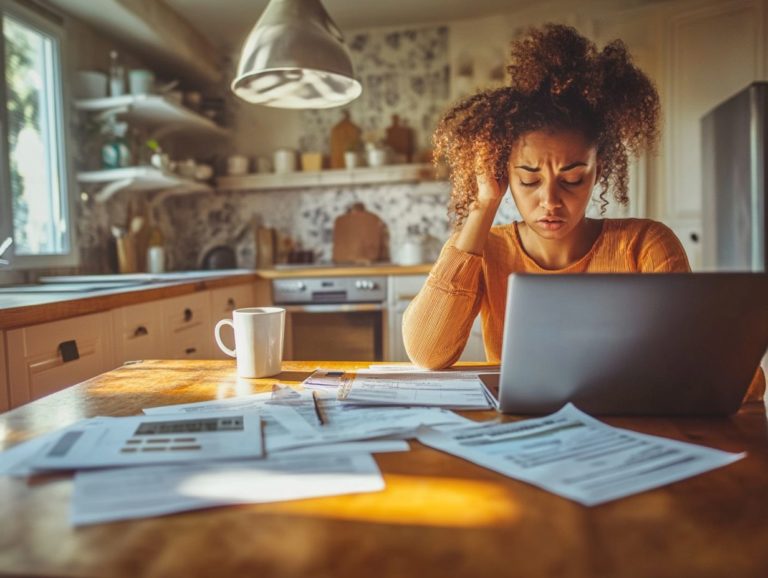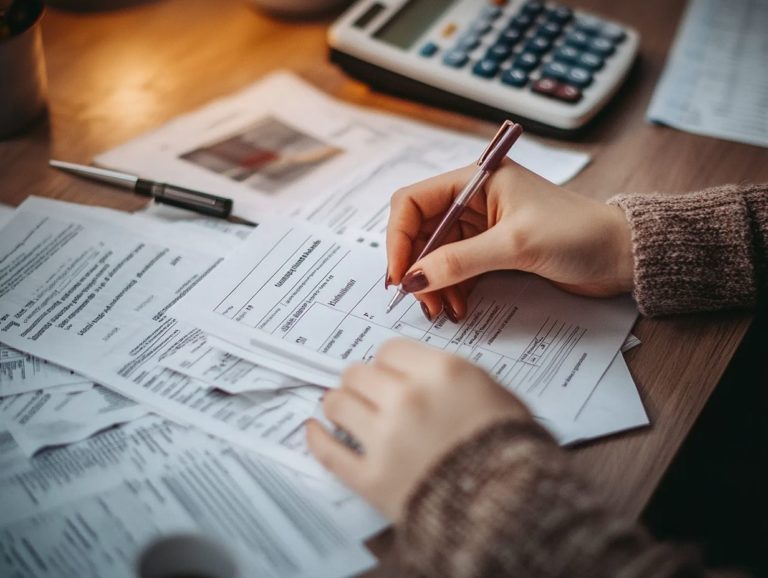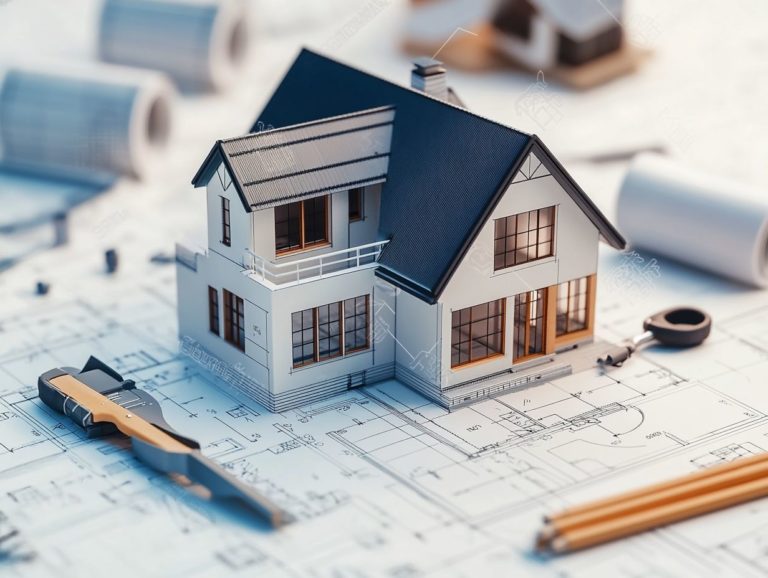The Impact of Natural Disasters on Home Insurance
Natural disasters can strike when least expected, throwing homes and lives into chaos. As a homeowner, understanding how these events impact home insurance is vital.
This article delves into the different types of natural disasters and their distinct effects on insurance policies. You ll find real-life examples and case studies that illustrate these impacts.
We ll also provide practical steps to prepare your home and coverage. This article also guides you through the recovery process, covering everything from navigating insurance claims to accessing government assistance.
Dive into these essential insights to protect your home today!
Contents
- Key Takeaways:
- Understanding the Relationship
- Types of Natural Disasters and Their Effects on Home Insurance
- Preparing for Natural Disasters
- Recovering from Natural Disasters
- The Role of Government Assistance
- Frequently Asked Questions
- What is the impact of natural disasters on home insurance?
- Are all natural disasters covered by home insurance?
- How can I prepare for natural disasters with my home insurance?
- Will my home insurance rates increase after a natural disaster?
- Can I still get home insurance if I live in a high-risk area for natural disasters?
- What should I do if my home is damaged by a natural disaster?
Key Takeaways:
Natural disasters can have a significant impact on home insurance, leading to higher premiums, coverage limitations, and potential policy cancellations.
Take proactive steps to safeguard your home and insurance. Invest in disaster-resistant features and review your policies regularly.
In the event of a natural disaster, navigating insurance claims and accessing government assistance can help homeowners recover and rebuild.
Understanding the Relationship
Understanding the relationship between home insurance and natural disasters is essential for you as a homeowner seeking financial security against potential risks.
With evolving weather patterns driven by climate change, the effects of natural disasters like hurricanes, wildfires, and floods have become increasingly severe. This necessitates a thorough reassessment of your insurance policies.
You need to understand homeowners insurance better, including coverage limits, exclusions, and how insurance companies handle financial losses. By conducting effective risk assessments, you can better prepare for the economic consequences of these disasters.
This ensures you have the right property insurance coverage tailored to your specific needs.
Types of Natural Disasters and Their Effects on Home Insurance
Natural disasters include a variety of catastrophic events, such as hurricanes, earthquakes, floods, wildfires, and severe storms. Each uniquely influences homeowners insurance.
Grasping how these disasters affect your coverage options is crucial for you as a homeowner. It enables you to mitigate financial loss when disaster strikes.
Examples and Case Studies
Examining real-life examples and case studies can truly shed light on the tangible effects of natural disasters on homeowners insurance claims. You’ll uncover the intricacies of the claims process and the financial implications of insurance deductibles, which are the amounts you pay out of pocket before the insurance kicks in.
These case studies become invaluable resources for understanding the recovery process that follows a disaster. Take Hurricane Katrina, for instance. The aftermath revealed the significant hurdles policyholders faced as they navigated through damaged homes and flooded neighborhoods.
Many were grappling not only with the destruction but also with the intricate details required for assessments. By maintaining a claim journal, individuals were better positioned to provide accurate information during evaluations, which often dragged on due to the extensive damage.
Similarly, the wildfires in California introduced their own set of challenges. Homeowners faced difficulties proving home value and documenting inventory losses. This experience shows why thorough documentation is vital throughout the claims journey.
Preparing for Natural Disasters
Preparing for natural disasters requires a thoughtful and strategic approach to risk management. It s essential for you to ensure that your homeowners insurance is comprehensive and that you consider additional coverage options tailored to address potential threats.
This proactive mindset mitigates the impact of disasters and streamlines your interactions with your insurance company. It makes it easier to navigate the intricacies of insurance premiums and policy reviews.
Steps to Protect Your Home and Insurance Coverage
Protecting your home and ensuring your insurance coverage remains effective requires a series of proactive steps aimed at reducing damage to your property from natural disasters. By regularly engaging with your insurance agent, you can explore relevant coverage options and adjust your home insurance policies to fit your needs.
One essential measure is to fortify your home against hazards like floods, hurricanes, or wildfires. This could involve installing storm shutters, reinforcing your roof, or incorporating fire-resistant materials into your home s design.
Understanding your specific coverage options is crucial. Take the time to review not just what is included but also any exclusions or limits that may apply. Regular communication with your insurance agent will keep you informed about updates or shifts in policy terms, ensuring that you remain covered even as insurance premiums fluctuate.
Being proactive can help you significantly mitigate the risks associated with unforeseen events and enhance your peace of mind.
Recovering from Natural Disasters
Recovering from natural disasters demands that you navigate the intricate process of filing insurance claims, managing rebuilding costs, and addressing any additional living expenses that may arise during your recovery.
It’s essential for homeowners like you to be well-versed in your insurance policies. This knowledge will empower you to facilitate the settlement of your losses effectively and minimize any potential financial setbacks.
Navigating insurance claims after a natural disaster demands a solid grasp of the claims process, rebuilding costs, and potential additions to your insurance policy that can improve your coverage. Engaging with your insurance agent will provide the clarity and guidance necessary to navigate this challenging phase of recovery.
Start by thoroughly documenting all damage with photographs and detailed notes, as this evidence will be critical for your claim. Next, gather any receipts related to temporary living arrangements or emergency repairs, since these costs may be covered under your policy.
It s crucial for you to carefully review your insurance policy to identify any endorsements that might enhance coverage. Maintaining open lines of communication with your insurance provider is essential, as this not only expedites the process but also minimizes the risk of discrepancies that could delay your financial support.
By meticulously following these steps, you can confidently navigate the complexities of the claims process and better secure the support you need.
The Role of Government Assistance
Government assistance serves as a vital lifeline in the wake of natural disasters, providing disaster assistance programs that can significantly ease the economic burden on impacted families and communities.
Agencies such as the Federal Emergency Management Agency (FEMA) offer critical support and resources to facilitate recovery and rebuilding efforts, ensuring that those affected can begin to restore their lives with the necessary aid.
Available Resources and Support
Numerous community resources and disaster assistance programs are at your disposal, ready to support you during the recovery process. These programs offer financial aid and expert guidance for navigating the complexities of property insurance claims. Engaging with your insurance company is crucial for maximizing the benefits available to you.
These initiatives often include local nonprofits and government programs that provide essential support, such as temporary housing, food assistance, and rebuilding services. Collaborating with these organizations can significantly lighten your recovery load, as their expertise helps you make informed decisions.
Maintaining a proactive relationship with your insurance agency is key to ensuring clear communication about coverage options and the necessary documentation. This approach will ultimately lead to a smoother process in securing the funds you need to effectively rebuild and recover.
Frequently Asked Questions
What is the impact of natural disasters on home insurance?
Natural disasters can have a significant impact on home insurance, as they can cause damage to your property and result in expensive repairs and replacements. This can lead to an increase in insurance premiums and potential changes in coverage.
Are all natural disasters covered by home insurance?
No, not all natural disasters are covered by standard home insurance policies. For example, floods, earthquakes, and hurricanes usually need extra insurance designed for specific disasters.
How can I prepare for natural disasters with my home insurance?
Review your home insurance policy regularly. Ensure you have enough coverage for potential natural disasters in your area.
You can also take steps to prevent damage. Installing storm shutters or reinforcing your roof can reduce potential damage and lower insurance costs.
Will my home insurance rates increase after a natural disaster?
Yes, rates may increase in areas prone to natural disasters. Insurance companies adjust rates to reflect the higher risk.
However, some insurers offer discounts for homeowners who take steps to minimize risks. Talk to your provider to learn how you can potentially lower your rates.
Can I still get home insurance if I live in a high-risk area for natural disasters?
Yes, you can get insurance but may need extra coverage for specific events like hurricanes or floods. Research your options and work with an agent to find the best fit for your location.
What should I do if my home is damaged by a natural disaster?
First, don t forget to snap photos of any damage. Document your losses and contact your insurance provider right away.
They ll guide you through the claims process and help you understand your coverage and options for repairs or replacements.




